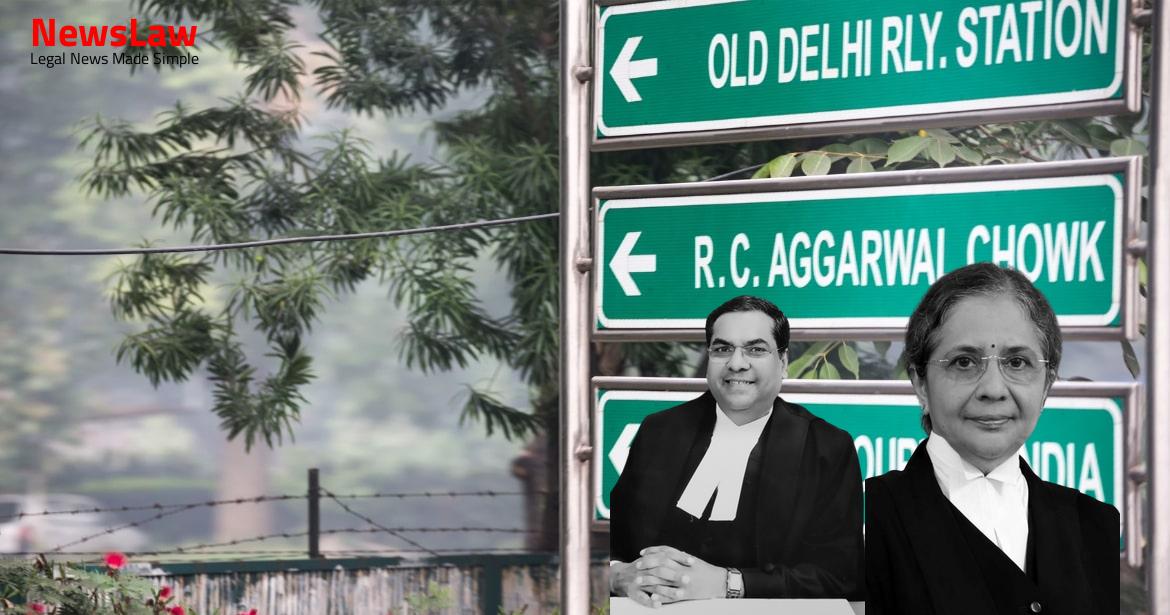In a significant ruling, the Supreme Court of India delivered its judgment on the case between the State of India and the appellant. The case involved the conviction under Section 304-B and 498-A of the IPC, related to a tragic incident of dowry death. The court confirmed the conviction but modified the appellant’s sentence to seven years of rigorous imprisonment, taking into account various factors. This judgment sets a precedent in legal justice and addresses critical issues surrounding dowry deaths in society.
Facts
- The deceased initially stated that the stove burst and caught fire, absolving anyone of responsibility.
- Multiple dying declarations were made by the deceased, casting doubt on their reliability.
- However, the last declaration specifically accused the mother-in-law of setting her ablaze.
- Witness testimonies and post-mortem report highlighted the severe burn injuries suffered by the deceased.
- The High Court overturned the trial court’s acquittal and convicted the mother-in-law under Sections 304-B and 498-A of the IPC.
- The High Court convicted the appellant under Section 304-B and 498-A of the IPC, sentencing her to life imprisonment and a fine for the offense under Section 304-B.
- No separate sentence was awarded for the conviction under Section 498-A as a substantive sentence was awarded for the major offense under Section 304-B IPC.
- The FIR was lodged promptly after the deceased’s death and on the instruction of the husband of PW1.
- The Investigating officer determined that the saree caught fire from the stove.
- The Sessions Judge had initially acquitted the appellant and co-accused of the charges under Section 304-B and 498-A of IPC, but the High Court overturned this decision.
- The High Court noted the close proximity between the demand of dowry and the deceased’s harassment by in-laws leading to her death.
- The High Court also considered a dying declaration where the deceased accused the appellant, her mother-in-law, of setting her on fire.
- While the trial court acquitted the appellant and other accused due to lack of evidence beyond reasonable doubt, the High Court convicted the husband and other family members under Section 498-A IPC based on re-evaluation of evidence.
Also Read: Jagdishchandra v. Joint Charity Commissioner & Ors.
Arguments
- The appellant argues that the High Court erred in not considering the lack of reporting of dowry demands to the police or elders before the incident.
- The appellant contends that the prosecution failed to establish the death as falling under ‘Death occurring otherwise than in normal circumstances’ under Section 304-B of IPC.
- There was an assertion that the prosecution did not provide substantial evidence of a current dowry demand or cruelty/harassment related to dowry prior to the incident.
- The appellant disputed the High Court’s reliance on the deceased holding the appellant responsible for her death as conclusive evidence.
- It was further argued that the High Court overlooked critical evidence and witnesses’ credibility by overturning the acquittal judgment of the appellant.
- The appellant objected to the High Court’s exclusive reliance on three dying declarations and failure to consider the possibility of parental influence in the third declaration.
- An error was alleged in the Court’s application of Section 113-B of the Indian Evidence Act through presumptions under Sections 304-A and 113-B.
- Trial court acquitted the accused without a proper reason.
- High Court reviewed the evidence and appropriately convicted the appellant.
- High Court erred in discarding earlier dying declarations where the deceased stated it was an accident due to stove burst.
- Argues that the dying declaration dated 13.02.2008 is not reliable and should have been discarded.
- State counsel seeks to sustain the High Court’s judgment by stating that the Sessions Court arrived at the wrong conclusion.
- A young lady aged 22 was killed for not fulfilling dowry demands.
Also Read: Legal Analysis: K.B. Lal vs. Gyanendra Pratap & Ors. – Condonation of Delay in Civil Appeal
Analysis
- The High Court’s conviction under Section 498-A IPC is justified based on the evidence presented by PW1 to PW4.
- The dying declarations of deceased Urmila on 06.02.2008 and 07.02.2008 were recorded in the presence of the accused, affecting the voluntariness of the statements.
- The third dying declaration on 13.02.2008, where the deceased specifically blamed the mother-in-law for setting her on fire, is considered reliable.
- The prosecution successfully demonstrated the harassment and demand for dowry leading up to the death of Urmila, satisfying the requirements of Section 304B IPC.
- The presumption under Section 113-B of the Evidence Act was raised against the appellant due to the evidence of dowry harassment and the unnatural death of Urmila.
- The detailed examination conducted by the High Court justifies the conviction under Section 304B IPC and the reliance on the dying declarations.
- Imposition of extreme punishment of imprisonment for life under Section 304-B IPC should be rare and not in every case, as per the case of Hem Chand Vs. State of Haryana (1994) 6 SCC 727.
- The High Court considered the consistency of dying declarations in the case of State of Karnataka Vs. Suvarnamma & Anr. (2015) 1 SCC 323, with one recorded by the police officer found consistent with circumstances, while the one recorded by the Magistrate was not.
- It is important to consider each dying declaration in its correct perspective to determine the true state of affairs, as per the principles laid down in Nallam Veera Stayanandam & Ors. Vs. Public Prosecutor, High Court of A.P. (2004) 10 SCC 769.
- Each dying declaration should be independently assessed for its evidentiary value, without rejecting one based on the contents of the other, as established in various cases like the one between Ashabai & Anr. Vs. State of Maharashtra (2013) 2 SCC 224.
- The quantum of sentence requires consideration in the case.
- The age of the appellant and her contribution to the family are important factors.
- The appellant’s husband is also aged.
- Considering all circumstances, the sentence awarded by the High Court to the appellant needs modification.
Also Read: Liability for Employee Actions in Contractual Disputes
Decision
- The conviction of the appellant under Section 304-B IPC and Section 498-A IPC upheld and affirmed by the High Court is confirmed.
- The High Court’s order for life imprisonment is modified to seven years of rigorous imprisonment, including time already served.
- The fine imposed and default sentence are upheld.
- The parties involved will bear their own costs.
- The appeal is allowed in part based on the above conditions.
Case Title: KASHMIRA DEVI Vs. THE STATE OF UTTARAKHAND (2020 INSC 99)
Case Number: Crl.A. No.-000724 / 2019



